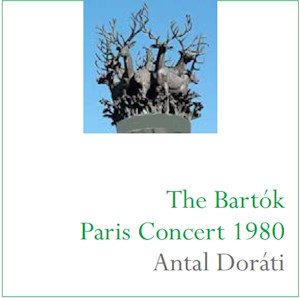
Béla Bartók (1881-1945)
The Paris Concert 1980
Music for Strings, Percussion and Celeste (1936)
Cantata Profana (1930)
The Miraculous Mandarin Suite (1927)
Dénes Gulyás (tenor); Sándor Sólyom-Nagy (baritone)
Chorus of French Radio
Orchestre National de France/Antal Doráti
rec. live, 29 November 1980, Salle Pleyel, Paris, France
Antal Doráti Centenary Society ADL353 [74]
Here is another interesting recording made available by the Antal Doráti Centenary Society, an all Bartók concert given in Paris in November 1980. It’s unclear whether this was given as part of an early celebration of the centenary of the composer’s birth the following March, but given Doráti’s close connection to Bartók, I’m sure no additional rationale would have been required to attract an audience to the Salle Pleyel.
Most of Doráti’s recordings of Bartók, most famously those on Mercury Living Presence, were made in the earlier part of his career. This concert comes much later, but what is noticeable is that in essence his approach remains essentially the same: clear lines, meticulous observation of rhythm and highly idiomatic playing marked by fidelity to the score. In other words, absolutely what one wants to hear in Bartók. I thought it might also be a good opportunity to experience Doráti’s Bartók in a little more modern sound, but whilst this disc is perfectly acceptable in that respect, on reacquaintance some of those older recordings still sound remarkably good.
The concert opens with a generally incisive performance of Music for Strings, Percussion and Celesta. It sounds like both groups of divided strings were quite large. This gives a nice depth and resonance to the sound but they are also pleasingly quite nimble and play with limited vibrato, which feels right. They also observe Bartók’s specific performance direction around glissandi, so that the first note of the sequence is left immediately and the remainder are played evenly within the value of that initial note. This detail makes such a difference to the sound and character of the piece but is surprisingly not something always scrupulously observed. The first movement fugue, which the score forbiddingly describes as ‘strictly executed’, in this performance belies any hint of academic connotations and is beautifully delivered, Doráti emphasising the ‘Tranquillo’ in the movement’s title. The Adagio third movement is a notable achievement for a live performance with the percussive sounds magically entering and sustained, everybody, audience included, seemingly not taking a breath for its duration. The final Allegro molto starts with superb attack but Doráti perhaps slightly overdoes the lessening of momentum at the first meno mosso direction and there’s a perceptible sag, so as Bartók asks for less and less movement as the movement progresses there’s a danger of actual inertia, threatening to if not derail things, then spoil the overall impact of the piece. It feels as if the Vivacissimo marking as the movement reaches its climax came as a relief to the players and they certainly seize it with relish. Overall, though, I enjoyed this a lot performance a lot and would certainly have been joining in with the warm applause at the end.
The Cantata Profana which follows was, and remains a relative rarity in live performance and on record. It’s based on a Romanian folk story which has obvious echoes from Greek mythology about a father who accidentally kills his sons who have been magically transformed into stags. Bartók created his own text from Romanian sources, which in its English and German translations at least does not really come over as the work of someone with a marked poetic talent, either in terms of the verse or crucially the structure. The first and third sections are a sort of commentary. The first a portentous introduction, the third a slightly bizarre recapitulation of the narrative which has just unfolded in the central second section. Musically it is scored for double chorus, tenor and baritone. Bartók interestingly took Schütz and Bach as his models for the choral writing but that does tend to give a rather monumental tone to a lot of the music. In short, it’s a difficult piece to realise successfully. I don’t think Doráti does quite manage to bring it off on his Hungaraton recording (HCD31503), where despite the passion of the solo singing in particular the overall effect is curiously uninvolving, even allowing for the fact that I think a slight sense of alienation is intentional. In the Paris performance, Doráti has competent soloists in Dénes Gulyás and Sándor Sólyom-Nagy, but the orchestral playing is hesitant throughout and the chorus, although mostly accurate seem to have no feel for how they ought to be singing: should it be dramatic, poetic, philosophical, detached, declamatory? It feels as if rehearsals focussed far more on the technical rather than the interpretative aspects.
No such problems exist with the characterful performance of Suite from The Miraculous Mandarin which ends the concert. It’s wonderfully theatrical. The pantomimic, decadently cynical qualities of the piece are played for all they are worth and whilst the strings and woodwind of the Orchestre National de France are excellent, the sneering, sarcastic brass section are superb. Doráti takes advantage of having a chorus around to add a sinister part of the ballet not normally included in the Suite where the body of the apparently dead Mandarin starts to glow. I’m not sure what I feel about this. The Suite has always worked well as a concert piece and the hybrid presented here feels an interesting but not completely dramatically successful experiment. Still the performance has plenty of impact as the applause testifies and Doráti completists will want this ‘edition’ of the Suite for its rarity value.
Again, the Antal Doráti Centenary Society have performed an invaluable service in surfacing another previously unissued performance. I hope there’s more to come to add to their impressive catalogue of studio and live recordings.
Dominic Hartley
Availability: Doráti Society (email)


















